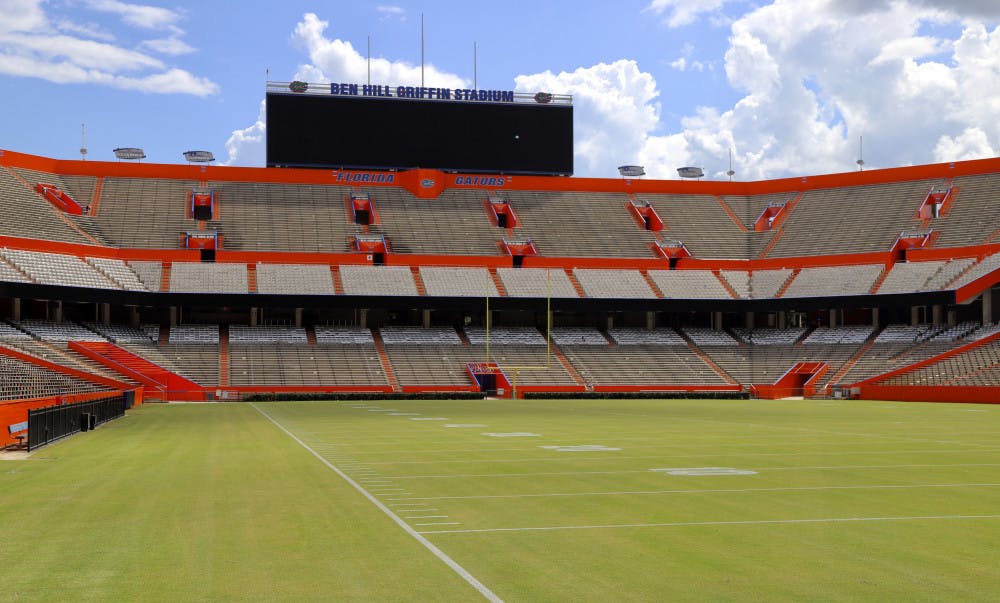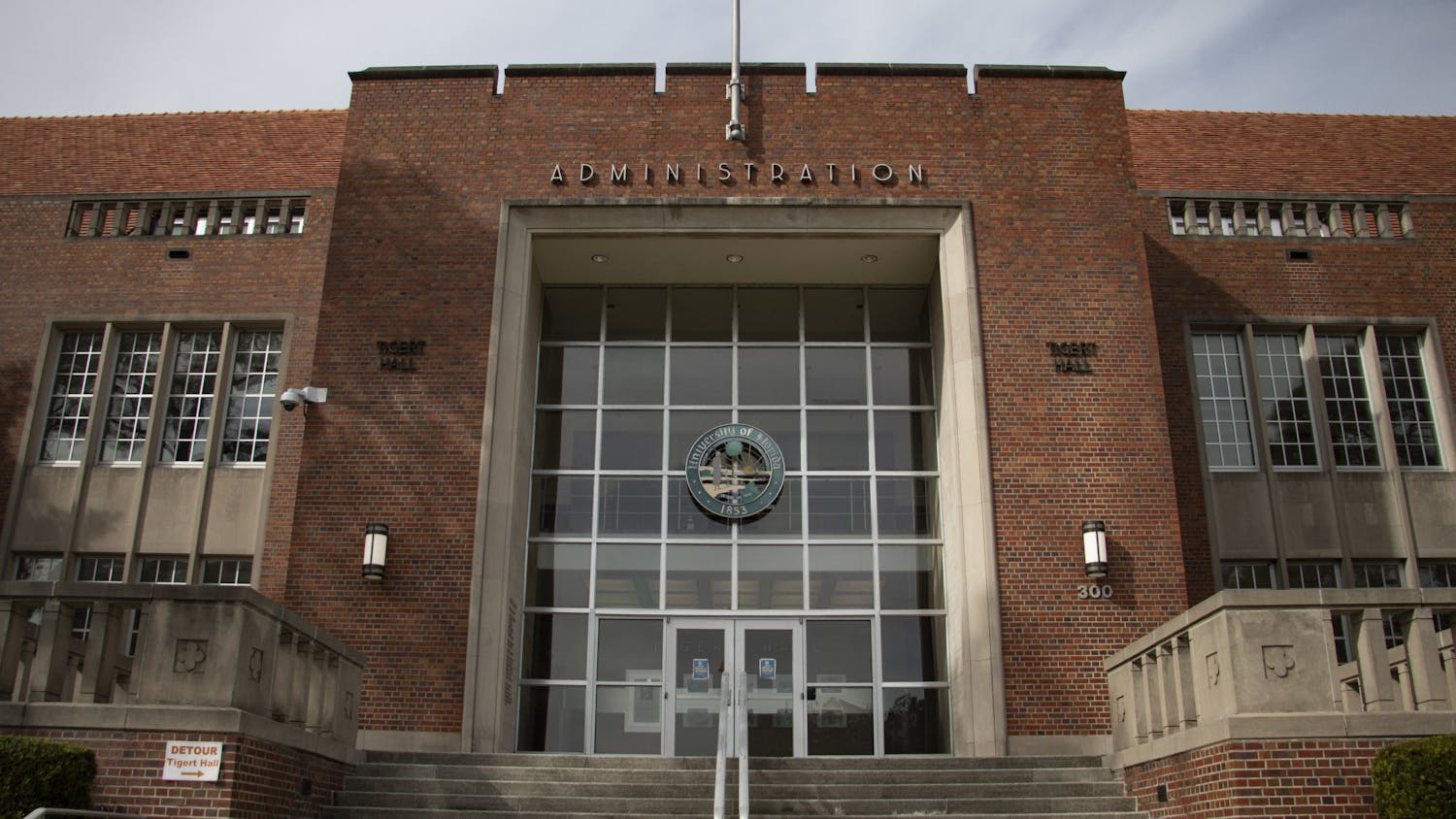Nearly four months after UF President Fuchs’ decision to eliminate the Gator Bait chant at football games, the Young Americans for Freedom are planning on bringing it back.
The student organization announced via a Facebook event page that it would be reciting the chant at the end of the first quarter in Saturday’s game against South Carolina — the home opener for the Gators.
On June 18, President Fuchs announced in an email to the UF student body that the university would be eliminating the chant, and it would no longer be performed at future UF sporting events, citing “‘horrific historical racist imagery associated with the phrase.’”
Phillip Smith, the president of YAF, said the organization is planning on doing the chant to preserve the tradition.
“It is an important part of campus culture and it was done away with for absolutely no reason,” Smith said. “It’s an insult to the student body because it is the university picking up on this cancel culture, the malaise that we’ve all fallen into. That’s why we wanted to pick up on it, because the reason for canceling it is admittedly false.”
Carl Van Ness, the official historian of UF, explained in more detail the racist history of the phrase.
“It goes back to probably the late 1800s or early 1900s,” Van Ness said. “There was a lot of imagery of African Americans being alligators. And in many cases, African American children and babies were being used as bait to lure alligators.”
Van Ness added that these postcards were hugely popular and had a massive impact in the south during that time. He said the gator bait phrase was just one of many in an effort to dehumanize Black Americans, which eventually led to massacres in Rosewood, Florida, and Tulsa, Oklahoma.
Smith said that while the phrase may have a checkered past, the chant does not.
“President Fuchs said in his statement that this chant has no racial undertones, and of course it doesn’t. It was created by a Black man who was part of the Gators National Championship team,” Smith said. “He led the crowd in the chant, and so there is no reason that it should be done away with.”
However, Fuchs' statement did acknowledge the chant's racial undertones. "While I know of no evidence of racism associated with our “Gator Bait” cheer at UF sporting events, there is horrific historic racist imagery associated with the phrase. Accordingly University Athletics and the Gator Band will discontinue the use of the cheer," Fuchs said.
In his defense of the chant, Smith referred to Lawrence Wright, an All-American safety who was a member of Florida’s title winning 1996 squad. Wright created the Gator Bait after the team won the title in ’96 and has been vehemently against the university’s decision to remove the chant.
Van Ness said that it is unclear if there is a connection between the chant and the phrase, but he added that the term first appeared in university records from the 1950s in reference to Florida’s football opponents.
He continued by saying that, although the chant may not necessarily be racist, he is still left uncomfortable by it.
“Once you become aware of these images, it is really hard to hear the ‘Gator Bait’ chant,” he said. “When I hear that chant now, I visualize those images and once you see those images, you can’t unsee them. You don’t want that kind of thing to have an association with something horrible.”
Van Ness added that it shows “a certain level of insensitivity” that YAF is planning on doing the chant, even after learning the history of it.
YAF was initially planning on doing the chat for the first home against Eastern Washington, but Smith said it had to make changes multiple times due to the new football schedule and the COVID-19 restrictions UF put in place.
As of Friday afternoon, over 1,500 people have marked “interested” on the event’s Facebook page, with over 300 listed as “going.”
Smith said he was caught off guard by the high number, but he doesn’t know exactly how many members of the organization will actually be in attendance at the Swamp on Saturday.
One concern that Smith has is that the chant will not be done in unison and that everyone will be at a different pace, especially without the band to help guide them.
“Everyone is going to be socially distanced, and there is going to be less people in the stadium so obviously something I’m concerned about is being able to synchronize,” he said. “All in all, though, it is out of my control. The COVID restrictions were kind of out of left field, so with all of these changes to games, we can’t lead the chant like we were hoping to.”
Smith added that the group hasn’t received any feedback from the university on this matter. The university and the University Athletic Association (UAA) both declined to comment on YAF’s decision.
In the end, Smith acknowledged that the university and President Fuchs will most likely not change course and reverse their decision, but the goal of this event is to just get the chant in the minds of Gators fans.
“We want to be able to have Gator fans keep the tradition that they’ve had for almost 30 years now,” he said. “I’d like the fans to know that their way of celebrating the team is still okay.”
This article has been updated. A quote from Smith said that Fuchs' statement regarding the Gator Bait chant said there were no racial undertones associated with the phrase, which is false.
Contact Noah Ram at nram@alligator.org and follow him on Twitter @Noah_ram1.
On Saturday, Ben Hill Griffin Stadium will house 2,000 students, among other fans, for the Gators' season opener. The UF chapter of Young Americans for Freedom plans to say the Gator Bait chant, despite the university's banning of the phrase at sporting events.

Noah is a third year journalism-sports and media student from Palm Beach Gardens, Florida. He has been with The Alligator since Spring 2019 and has covered men’s and women’s tennis, gymnastics and volleyball. When he isn’t on his beat, Noah is usually sadden over his beloved South Florida sports teams, such as the Heat and Dolphins.






